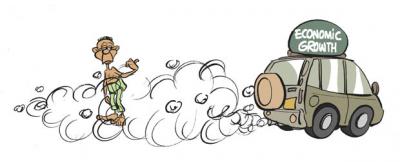On this 17th October, the world is commemorating the International Day for the Eradication of Poverty. In less than a year, the UN Millennium Development Goals will come close to its target Year 2015 and now is the right time to take a stock of the progress achieved in poverty alleviation especially in our African region.
We often hear about the impressive economic growth in Africa and yet this is the only region which is still off-track as regard to the Eradication of Extreme Poverty. The percentage of African living on less than US$ 1.25 a day has slightly decreased from 56.5% in 1990 to 48.5% in 2010 but is still far from the target of 28.3% (i.e, half of 56.5%). Sub-Saharan African countries lag far behind the other regions as far as social development indicators are concerned.
Economic Growth and poverty reduction
It is generally agreed that economic growth does bring reduction in the poverty level of a country, but in the case of Africa, one may find conflicting results about poverty reduction resulting from economic growth.
According to a study carried out in 2012 by the University of Sussex in 11 African countries, it was found that all of the countries experienced positive economic growth and this resulted in a significant reduction in their poverty incidence. In another survey carried out by Afrobarometer, it was found that economic growth is actually not helping the poor African and that African countries have not succeeded in reducing poverty despite remarkable economic growth over the past decades. The report concluded that « either economic growth is not trickling down to average citizens and translating into poverty reduction… [or] there is reason to question whether reported growth rates are actually being realised ».
The fact remains that despite Africa experiencing the world highest economic growth rate, there is still a high level of poverty in the region and there is still food shortage, lack of clean water supply and shortage of basic healthcare. For nearly half of the African population, it still remains a challenge to get the basic daily needs and absolute poverty remains visible across the continent. Although the population in rural areas is able to engage in subsistence farming and animals rearing to get their daily food for their families, the people might not be able to provide other basic needs like decent housing, clothing and education.
There are many reasons why economic growth is not bringing in the expected reduction in poverty level in Africa. Firstly this is due to the rising inequality in the African economy, which means that the population at the lower level does not benefit from economic progress. The second reason concerns the mismanagement of revenue from exploitation of natural resources. The problem of corruption and tax evasion has led to a situation that some African countries loses lot more through illegal financial outflow than it gets in foreign aid and FDI put together. Finally, lack of public infrastructure such as roads, water supply, access to electrical and other basic services have also hindered the chance of people getting out of poverty.
African poverty a rural phenomenon
Although there exists some poverty in the cities, but in general poverty in Africa is predominantly a rural phenomenon, which is very different from the Asian situation. There are big differences between a city and a village in terms of social development and infrastructure. From a political point of view, this may be explained by the fact that governments concentrate all their financial resources in the urban areas while neglecting the rural areas, which are often dominated by scattered minor tribes without much political influence. The rural population are often poorly organised and are so isolated that they are out of the reach of social aids and poverty alleviation programmes.
The Afrobarometer study rightly concluded that economic growth in African countries is less effective in reducing poverty than elsewhere in the world. The January 2014 issue (No 56) of The African Report magazine has estimated that by the year 2030, 60%-80% of the world’s poor will be living in Africa despite the continuous economic growth in the region. Eradication of extreme poverty on the continent is therefore still a very slow process.
Poverty in a Developing Africa
- Publicité -
EN CONTINU ↻


